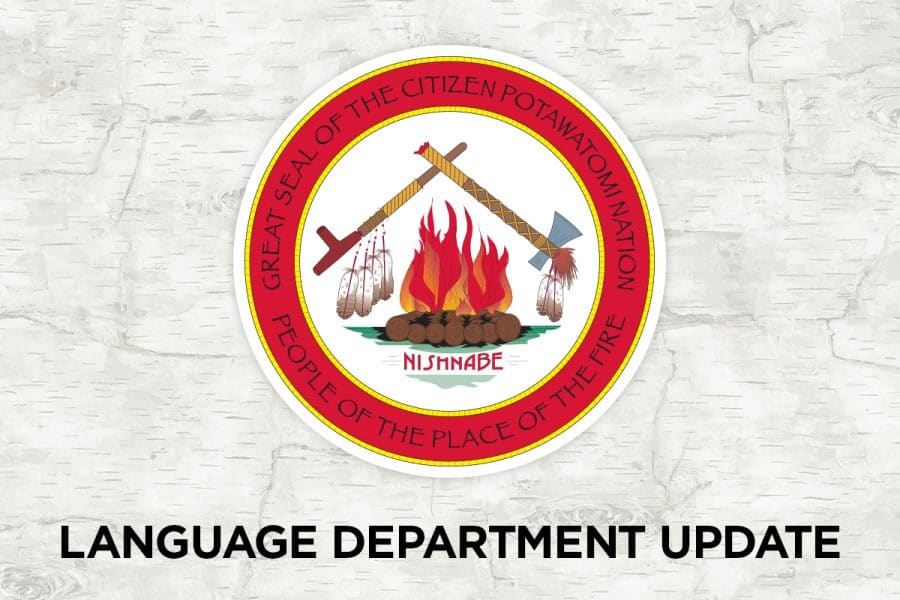By Justin Neely, CPN Language Director
Our online high school course has really taken off this year. We have four schools offering Potawatomi for language credit for graduation in Oklahoma. Tecumseh, Wanette, Maud and Shawnee. We hope to be able to offer the course for even more students in the near future. If you have a student in high school in Oklahoma, have them talk to the principal about offering Potawatomi in your school. It may require a little extra work, like approval by the local school board, but let them know there is no cost to the school. All the students need is internet access and a teacher who can sit in the room with the students. They can contact me so I know where to send the grades.
During these trying times, make sure to try the many online resources available for learning the language.

Check out our online dictionary that contains over 9,000 words. We have an online, self-paced Potawatomi language course available on Moodle. If you have access to Facebook, we have a Facebook page called Potawatomi Language where we post updates, classes, videos and talk about all things Potawatomi language. We also have two YouTube channels with hundreds of videos — one for kids and another for adults. Our Memrise website has three different courses that you can study from, as well. Lastly, we have two Quizlet tools filled with many vocabulary study sets.
- Online dictionary: potawatomidictonary.com
- Online Moodle Course: cpn.news/moodle
- Children’s Moodle Course: cpn.news/moodlekids
- Cultural Teachings: cpn.news/stories
- Kids YouTube page: cpn.news/youthvids
- Adult YouTube page: cpn.news/JN
- Facebook Page: cpn.news/langFB
- Memrise: cpn.news/memrise
- Bodewadmimwen Quizlet: cpn.news/quizlet
- Potawatomi Quizlet: cpn.news/quizletcards
If you have not checked it out already, we also have Gulliver’s Travels, the hour-long cartoon version you can watch all in Potawatomi with subtitles on YouTube: cpn.news/gulliver
The Pokagon Potawatomi have a course available on Mango for learning our language. They also have an app on the Google Play store called Bodwèwadmimwen for learning basic Potawatomi words/phrases in categories.
Mango Potawatomi course: cpn.news/mango
Anet Bodéwadmimwen Dgwaget kedwnen:
Some Potawatomi sentences for fall:
Datbegon watébgyanon ene dgwagek.
The leaves are changing color since it is becoming fall.
Tkéya mget zagech gnebéch da biskemen gazhoyak.
It’s cool outside. Maybe you should put on some warm clothes.
Gda-mawdoshke’anen ne ni datbegon nekmek shena zhi ténon.
Could you rake the leaves? They are all over the place.
Babwichgen! Abdek nwi-askonye bgéji ksenya mget.
Wait! I have to change. It’s a little cold.
Biskowagen ne ggi-byédon iw pi gishkepkonyak wa je ksenyamgek.
Did you bring a jacket? It’s going to be cold when it gets dark.
Weswen ne ggi-majibdon kyetnam ewi ksenyamgek dbekek.
Did you turn on the heater? It’s really going to be cold tonight.
Penik ne ggi-bnegwenak?
Did you peel the potatoes?
Msezé wiyas mine Shashag penik nwi-gebatonen.
I am cooking turkey and mashed potatoes.
Mdamnek ne ggi-mshishknak?
Did you shuck the corn?
Netem ne sikdekiwen ezhewébek shode.
Has the first frost happened here?
Nish Kche yabek ngi-wabmak ezhi jigakwak.
I saw two big bucks over there by the edge of the woods.
Ngi-bashksewa ngot nijan mine bshkonwek o yabe.
I shot one doe, and I missed a buck.
Gda-Bitoshkan eko ksenyamget wéyabek.
You should dress in layers since it’s going to be cold tomorrow morning.
